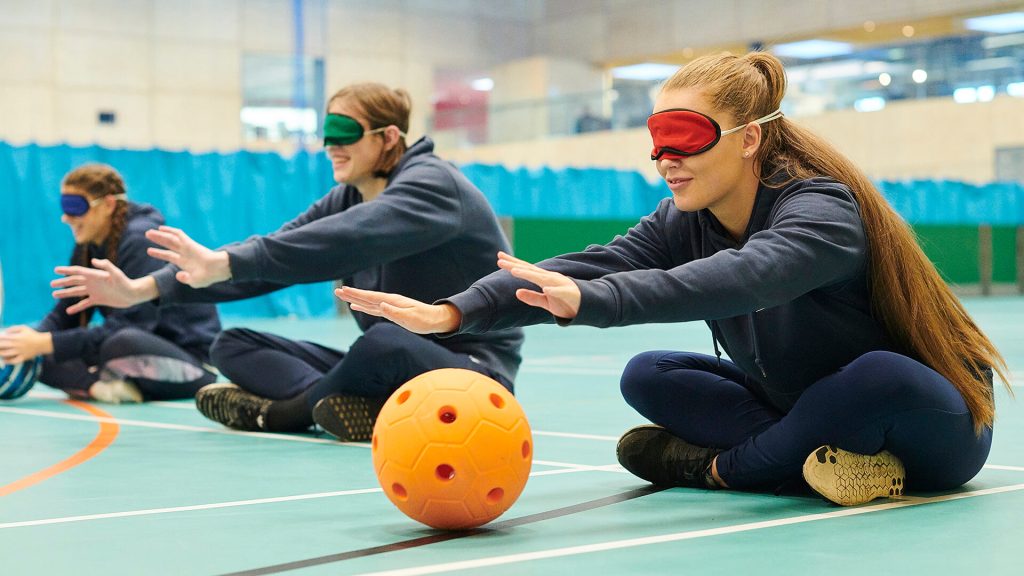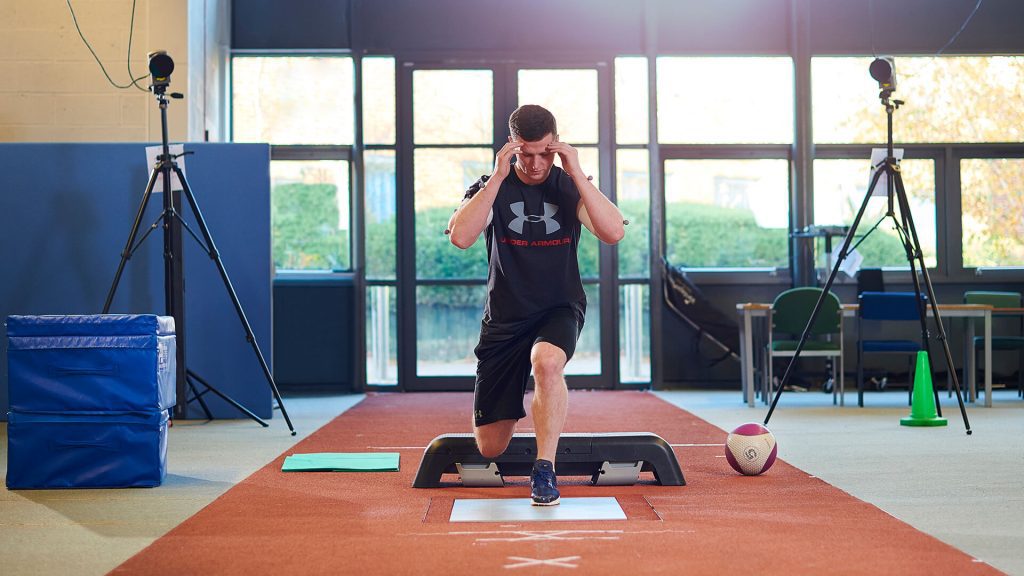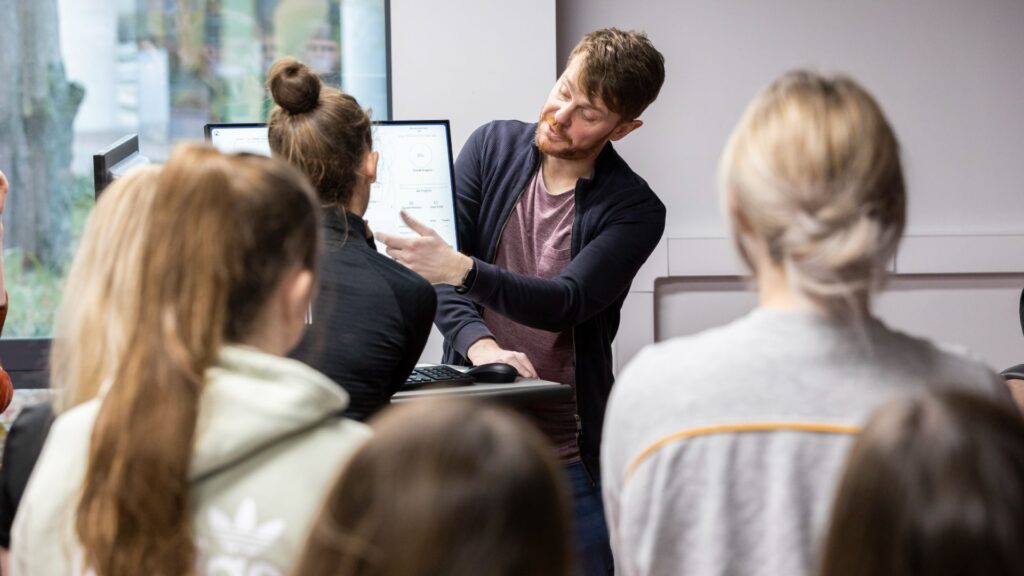Psychology with Sport and Exercise Perspectives BSc (Hons)
UCAS code: C813
How do you create a champion? Unravel the importance of psychological wellbeing and understand the fundamentals of performance and sport engagement. Our accredited sport and exercise psychology degree helps you bring out the best in athletes and promote physical activity.
Overview
| Course length: | 3 years full-time 6 years part-time |
|---|---|
| Start dates: | September 2026 |
| Location: | Edge Hill University |
| Example offers: | BBB-ABB (A Level) or DMM (BTEC)120-128 UCAS Tariff points View full entry criteria |
| Subject(s): | Psychology |
| Faculty: | Arts and Sciences |
| Department: | Psychology |
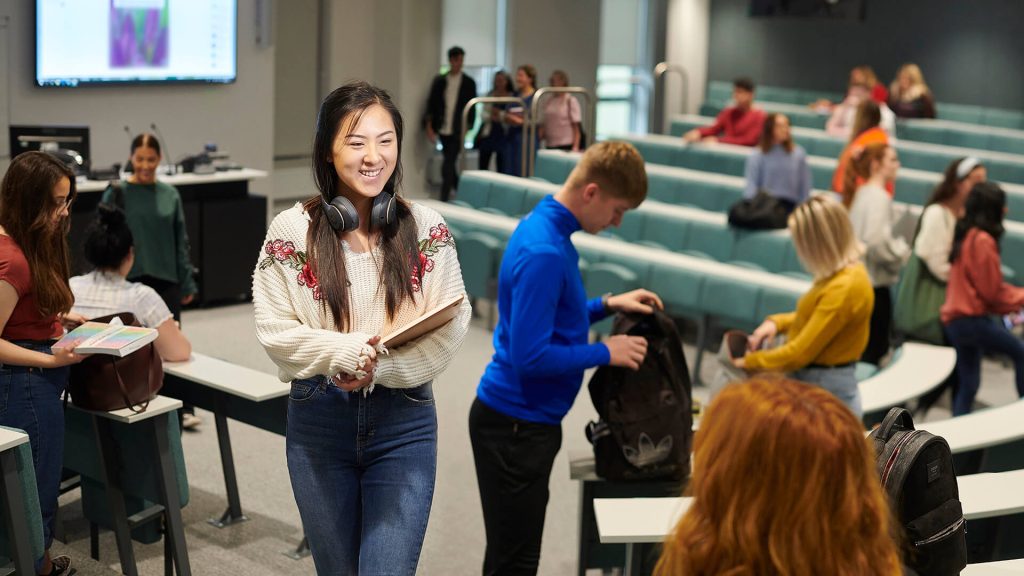
Psychology is becoming an important area for athletes who want to get the edge over their competition. During this degree you’ll look at the power our minds can have over performance and motivation.
Within the Department of Psychology, you’ll benefit from hands-on learning to help you pinpoint the mental barriers preventing people from being active. You’ll be conducting interviews and observations, and complete research.
We’ll look at the influence of exercise on psychological wellbeing and equip you with an understanding of the principles of psychology that will act as a foundation for your future career.
There are three key reasons why we believe that studying Sport and Exercise Psychology at Edge Hill gives you an advantage over studying elsewhere:
- We can help you think like a Psychologist – the applied focus of our curriculum and practical learning opportunities, enables you to apply your subject knowledge to personal and professional scenarios
- We can help you get more from being a Psychology student- our ethos of student involvement means we open up opportunities for you to be part of our psychology community
- We give you access to psychology experts- all our academic staff are research-active and we also have registered psychology practitioners representing areas including Sport and Exercise Psychology.
A BPS accredited degree
This course is accredited by the British Psychological Society(BPS) as conferring eligibility for the Graduate Basis for Chartered Membership GBC), which is the first step towards becoming a chartered psychologist.
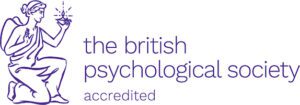 British Psychological Society - accredited
British Psychological Society - accredited
Course features
-
International students can apply
-
Professional accreditation
-
Sandwich year option available
-
Studying abroad option available
-
Work placement opportunity
What you'll study
Your first year will cover the relationship between brain and behaviour. You’ll study personality and individual differences, before studying data analysis and research methods that underpin psychological science. We’ll also give you the chance to develop your academic and interpersonal skills to help with employability and your future career aspirations. Finally, a sports-centric module will introduce sport and exercise psychology.
You’ll develop your critical thinking in Year 2 of your BSc (Hons) Psychology with Sport and Exercise Perspectives degree, covering four main areas of psychology; social, developmental, biological and cognitive. We’ll delve deeper into human behaviour with an investigation into social skills and you’ll embark on a group research project. In our sports module, we’ll check out sports skills and performance, plus exercise participation and its benefits for mental health.
Apply your psychology and sports know-how to real-world challenges in Year 3. Two applied sports and exercise modules will shape your understanding of how physical activity and exercise behaviours can be changed and maintained. Plus, you’ll choose an area of interest then research and submit a dissertation using all of the skills you’ve gained over our BSc (Hons) Psychology with Sports and Exercise Perspectives degree.
How you'll study
This degree is housed in the Department of Psychology. Teaching methods include lectures, tutorials, seminars and workshops. Our dedicated laboratories allow hands-on exploration of how we can use different measurements to understand issues related to sport and exercise psychology. There is a wide range of IT facilities, including experiment generation and statistical packages.
Typical time commitment for scheduled sessions is approximately 2.5 days per week, with the remainder of the time dedicated for self-directed study.
How you'll be assessed
Most modules are assessed through a mixture of examination and coursework, although some are assessed solely by coursework. Assignments may be traditional essays and literature reviews, research project reports, case studies and oral presentations. In Year 3, you will complete your dissertation project.
Who will be teaching you
You will be taught by highly experienced and enthusiastic tutors with a real commitment to teaching, research and consultancy in sport and exercise settings. The team is made up of British Psychological Society (BPS) Chartered Psychologists and Chartered Sport and Exercise Psychologists. As a team we are dynamic, friendly and supportive of your needs.
The Department of Psychology operates a research internship scheme where you may have the opportunity to volunteer to assist with staff research across a range of exciting projects. Previous projects have focused on subjects including eye movements and memory, alcohol and inhibition, autistic traits, attentional bias to pictures and words, personality and offending behaviour, behaviour change and food awareness, multiple perspective taking, the neural underpinnings of action simulation, and the question of whether emojis reveal true emotions.
Partner and Placement Providers
We work with a range of external partners who contribute to our courses. Some of our partners and/or placement providers include: HMPPS, Reachout ASC, Empower Psychology Services Limited, Mosaic, TRU Rehab, Mersey and West Lancashire Teaching Hospitals NHS Trust, Knowsley Council, Colne Citadel, Enterprise mobility, West Lancashire Borough Council, Anthony Walker Foundation, Royal Air Force, Autism Initiatives, Airborne Environmental consultants, Cassidy Media Partnership, Aaban Partnership Limited, ABL Health LTD, Mersey Care NHS Foundation Trust: Personality Disorder Hub, Targeted Services, Wigan Council: Youth Support Services, ReEngage Northwest LTD: Wellbeing Coaching services.
Entry criteria
Typical offer 120-128 UCAS Tariff points, for which no specific subjects are required, plus GCSE English and GCSE Mathematics at Grade C or Grade 4 or above (or equivalent).
Please note, for the purposes of studying psychology, level 2 literacy and numeracy qualifications are not considered as equivalent to GCSE Grade C or Grade 4 in English Language and Mathematics.
Example offers
| Qualification | Requirement |
|---|---|
| A Level | BBB-ABB. |
| UCAS Tariff points | 120-128 points. |
| BTEC Extended Diploma (or combination of BTEC QCF qualifications) | Distinction, Distinction, Merit (DDM). |
| T Level | Overall grade of Merit. |
| International Baccalaureate (IB) | We are happy to accept IB qualifications which achieve the required number of UCAS Tariff points. |
| Access to Higher Education Diploma | 45 credits at Level 3, for example 24 credits at Distinction and 21 credits at Merit or 30 credits at Distinction and 15 credits at Merit. The required total can be attained from various credit combinations. |
Please note, the above examples may differ from actual offers made. A combination of A Level and BTEC awards may also be accepted.
If you have a minimum of two A Levels (or equivalent), there is no maximum number of qualifications that we will accept UCAS points from. This includes additional qualifications such as Extended Project Qualification (EPQ), AS Levels that haven't been continued to A Level, and General Studies AS or A Level awards.
English language requirements
International students require IELTS 6.0, with a score no lower than 5.5 in each individual component, or an equivalent English language qualification.
Fair Entry Criteria
Our new Fair Entry Criteria is a Contextual Admissions Policy that takes an applicant’s personal and educational background into account. This policy will allow eligible applicants to receive up to a two-grade reduction in their entry requirements for this course. Find out more and see if you qualify.
How to apply
Apply full-time
Read our guide to applying through UCAS to find out more about the application process.
International
Please see our international student pages for further information about how to apply as a prospective international student.
Should you accept an offer of a place to study with us and formally enrol as a student, you will be subject to the provisions of the regulations, rules, codes, conditions and policies which apply to our students. These are available at www.edgehill.ac.uk/studentterms.
If you join a full time undergraduate degree at Edge Hill University, we will guarantee you the offer of a room in our halls of residence for the first year of your course.
Discover our accommodation
Facilities
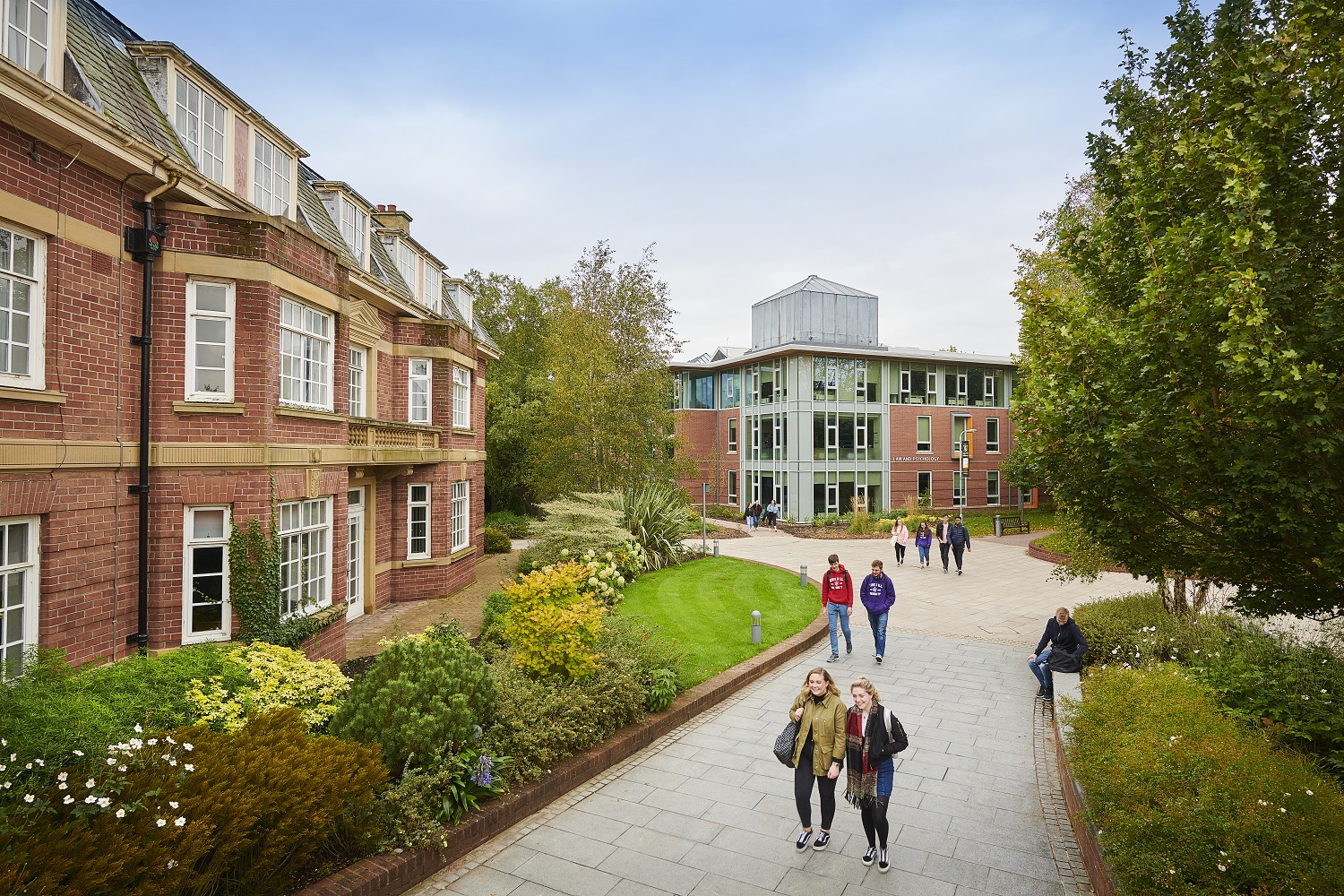 The £6m Law and Psychology building provides contemporary teaching and learning facilities for students in the Department of Psychology.
The £6m Law and Psychology building provides contemporary teaching and learning facilities for students in the Department of Psychology.
The three-storey building includes a 250-seat lecture theatre, seminar and tutorial rooms, and social learning areas which encourage a more informal and interactive style of learning. There are also specially designed experimental facilities for psychological research.
We have a wide range of state-of-the-art facilities, including research equipment to help us understand human thought and behaviour. Many of these can be used to research issues relevant to sport and exercise psychology. Our Magnetic Stimulation (TMS) equipment is used to stimulate brain regions to directly manipulate the functioning of the brain. TMS is currently being explored as an effective as a form of neurorehabilitation to support recovery from upper limb injury. In the context of sport injury and rehabilitation, this could present an efficient alternative to traditional physical rehabilitation.
We also have a Coaching Psychology Clinic which is led by our registered Coaching Psychologists. Many people interested in Sport and Exercise Psychology might apply coaching principles to their professional practice. As such, there can be a significant overlap between sports coaching when used in sport and exercise contexts, as there might be in coaching psychology practice.
Finally, our BioPac equipment is used to measure physiological responses such as skin conductance, and heart rate. A large part of Sport and Exercise Psychology involves an understanding of physiological and physical processes involved in movement planning and execution. BioPac therefore can provide an objective way of measuring automatic physiological responses such as heart-rate to help measure things like people’s endurance and performance when engaged in different levels or types of physical activity.
Where you'll study
Finance
Tuition fees
UK Full-Time
£9,790
a year
International
£18,000
a year
EU/EEA and Swiss students who have settled or pre-settled status under the EU Settlement Scheme, as well as Irish nationals, may be eligible for the UK tuition fee rate.
Financial support
Subject to eligibility, UK students joining this course can apply for a Tuition Fee Loan from the Government to cover the full cost of tuition fees. UK students enrolling on the course may also be eligible to apply for additional funding to help with living costs.
Scholarships
We offer a range of scholarships, which celebrate the determination, commitment and achievement of our students. Many of our scholarships are awarded automatically. There are some however, where you will need to be involved in an application or nomination process. To find out more about our scholarships and check your eligibility, please visit our dedicated scholarships pages.
Money Matters
Please view the relevant Money Matters guide for comprehensive information about the financial support available to eligible UK students.
EU/EEA and Swiss students who have settled or pre-settled status under the EU Settlement Scheme may be eligible to apply for financial support. Irish nationals can ordinarily apply to Student Universal Support Ireland (SUSI). If you are an EU student who does not have settled or pre-settled status, or are an international student from a non-EU country, please see our international student finance pages.
Tuition fees
UK Full-Time
£9,535
a year
UK Part-Time
£79 per credit
for the course
International
£17,000
a year
2026/27
Entry fees for 2026/27 and subsequent years are subject to inflationary rises in line with Government policy. These will be confirmed as soon as they become available.
EU/EEA and Swiss students who have settled or pre-settled status under the EU Settlement Scheme, as well as Irish nationals, may be eligible for the UK tuition fee rate.
Financial support
Subject to eligibility, UK students joining this course can apply for a Tuition Fee Loan from the Government to cover the full cost of tuition fees. UK students enrolling on the course may also be eligible to apply for additional funding to help with living costs.
Scholarships
We offer a range of scholarships, which celebrate the determination, commitment and achievement of our students. Many of our scholarships are awarded automatically. There are some however, where you will need to be involved in an application or nomination process. To find out more about our scholarships and check your eligibility, please visit our dedicated scholarships pages.
Money Matters
Please view the relevant Money Matters guide for comprehensive information about the financial support available to eligible UK students.
EU/EEA and Swiss students who have settled or pre-settled status under the EU Settlement Scheme may be eligible to apply for financial support. Irish nationals can ordinarily apply to Student Universal Support Ireland (SUSI). If you are an EU student who does not have settled or pre-settled status, or are an international student from a non-EU country, please see our international student finance pages.
Your future career
The study of psychology offers the skills needed to find your feet in the sports, health and fitness industry – although you may need to commit to further training depending on your chosen career path.
Our sport and exercise psychology degree is the first step to becoming a chartered sports psychologist or psychologist, so if you’d like to specialise in this area, you’ll need to complete postgraduate studies.
Some students find themselves transferring to other industries such as advertising, healthcare and education using the transferrable skills developed at Edge Hill.
After graduation some of our sports students have gone on to secure rewarding roles at Blackpool FC, London Broncos Rugby League and Leeds Teaching Hospital.
At Edge Hill, we have a range of aligned postgraduate pathways which can enable you to continue your journey in Sport and Exercise Psychology. These include: MSc Health Psychology, MSc Coaching Psychology, MSc Applied Sport and Exercise Science and MSc Sport, Physical Activity and Mental Health.
You could find yourself working in areas such as:
- Sports Development officer
- Health improvement practitioner
- Coach educator
- Athlete liaison officer
- Performance lifestyle advisor
- Community educator/officer
- Health educator/officer
- Wellness coach
- Physical Activity Programme Coordinator
- Health trainer
- Performance sports scientist
Course changes
Every effort has been made to ensure the accuracy of this information, however our courses are subject to ongoing review and development. Changing circumstances may necessitate alteration to, or the cancellation of, courses.
Changes may be necessary to comply with the requirements of professional bodies, revisions to subject benchmarks statements, to keep courses updated and contemporary, or as a result of student feedback. We reserve the right to make variations if we consider such action to be necessary or in the best interests of students.
